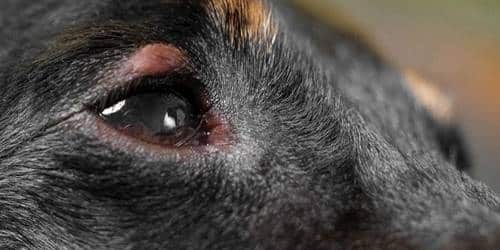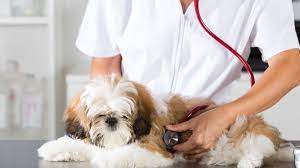Are you expecting your first litter of puppies and wondering when they will start walking and opening their eyes after birth? Maybe you just got your first puppies and are wondering when they will be able to walk on a leash and open their eyes. In any case, I’ve got you covered with this guide to when puppies start walking and opening their eyes at different stages of their lives. First, a quick answer focusing on newborn puppies. You can read more about when puppies start walking properly on a leash a little further down the page.
When do puppies start walking? Puppies should be walking properly by the age of 4 weeks after birth. They will begin to stand at 2 weeks and will be able to climb out of their whelping box at 3 weeks. The puppy will begin to walk unsteadily by the age of four weeks.
Between 4 and 7 weeks, puppies can walk properly with a steady gait after learning how to balance with some short walks. Here’s more information on those crucial first steps, where they can explore their surroundings by walking independently.
When Do Puppies Start Walking?
Puppies are not born with the ability to walk. Newborn puppies, like human babies, are extremely fragile. But when do puppies start walking and opening their eyes? Human babies do not begin walking until they are nine to 18 months old, whereas puppies begin walking around three to four weeks old. It won’t be long before they’re constantly playing, chasing, and acting adorable.
Puppies Start to Walk at a Very Young Age
Newborn puppies are helpless but adorable. Their eyes are closed at first, and they mostly sleep and crawl around. When their eyes open, they become more curious about the world (around two weeks). This insatiable curiosity drives them to stand and walk.
Puppies start to stand and look around when they are three weeks old (around 21 days). They may even attempt to escape from their pen. They can walk by the time they are four weeks old (about 28 days). Of course, this varies. Some people may start standing after two weeks and progress more quickly. In general, your puppies should be walking and even running by the time they’re four weeks old.
If you’re adopting a puppy, you won’t likely see many of these developmental stages unless your dog has pups. Puppies are usually not placed in new homes until they are at least two months old. They should be able to stand on their own by then.
When Can You Start Puppy Training?
Even if actual training does not begin until your puppy is a few months old, you can start socializing him right away. If your dog has puppies, you can handle them gently to aid in their socialization even before they can walk. You can handle them more when they’re three to eight weeks old to get them used to your smell, and you can start playing with them when they’re close to two months. Take care not to frighten them.
Leash training can start as early as eight to twelve weeks of age. First, let your puppy wear a collar and leash for a few minutes while you give her treats. Then, while wearing a leash, train her to come to you by rewarding her with treats accompanied by a cue sound, such as a clicking noise. Once you’ve mastered this, try walking your puppy on a leash inside before taking him outside.
Start walking your puppy outside, where she can interact with other dogs, when she’s about 16 weeks old, or a few weeks after she’s been fully vaccinated. You can take her to training classes with other puppies her age who are at the same vaccination stage before that. These classes will provide her with valuable socialization opportunities. You can also socialize her with adult dogs you know well, but only if they are fully vaccinated.
Puppies may start out helpless, but before long, they’re opening their eyes, walking, and becoming very curious about their surroundings. Your puppy will be ready to start leash training soon after this. You both are in for a world of exciting adventures, road trips, and playtime.
Should a Puppy Start Walking at Four Weeks?
Puppies should be walking and opening their eyes by 4 weeks. If your puppy isn’t showing any of the above normal signs of development, you should take him to the vet. At 7 weeks and up, they should have developed their little barks.
At what Age do Puppies Start Walking Properly?
Your puppy will develop and mature quickly at four weeks of age. His leg muscles will keep getting stronger, and his shaky walk will start to get steadier. Your puppy’s walking ability will improve between the ages of four and seven weeks until he walks with a steady gait. He’ll be fully active by seven to eight weeks, running around and causing general chaos in the house—and probably biting at your ankles!
You can start taking your puppy for short walks around the garden or house when he is eight weeks old. Exercise and playtime are essential for the development of your puppy. But don’t go overboard. Their bones and joints are fragile until they reach the age of two.
When Should Puppies start Walking on a Leash?
Even though it is best not to take your young puppy to the dog park before vaccinations, you can introduce them to the collar, harness, and leash. For example, at the age of 8 weeks and up, you can start walking your puppy on a leash.
Puppies do not have the natural ability to walk with a collar and leash on the first try! You must teach them this skill, so be patient. The ideal age to start introducing your puppy is between eight and ten weeks. Start by introducing him to the sensation of wearing a collar and/or a harness for brief periods. You could also use the leash to keep him in control while he’s playing or walking around the house.
You could reward him with treats and make wearing a collar and leash enjoyable for him. This way, every time you bring out the leash, you’ll get a positive reaction. When your puppy is learning to walk on a leash, make a cue sound, such as clicking or saying, “Here boy.” You can reward him when he responds to the cues and walks toward you while wearing the leash.
You can take your puppy outside once he is comfortable walking with a collar and leash in the house. Keep him in your garden or backyard until he’s old enough to go for a walk around the neighborhood or to the dog park.
When Do Puppies Start Walking and Opening Their Eyes?
The puppies’ eyes are still closed at one week old. Their eyes will open in the second week of life, usually between the ages of 10 and 16 days. They will, however, be unable to see clearly at first. The eyes will gradually open wider, revealing grayish-blue, hazy eyes. Puppies’ eyes will continue to grow over the next few weeks. By the time they are eight weeks old, they will have full vision.
Puppies’ ears open around the same time as their eyes, which is usually around 12 to 14 days old. Their hearing will continue to develop until the puppies are about five weeks old.
For the first two weeks of their lives, newborn puppies cannot fully support their weight, so they crawl around on their bellies, paddling and pushing with their legs to gain strength. Most puppies can stand up on their forelimbs around 5 to 6 days of age and start using their hind legs around two weeks of age. They usually start walking with a wobbly gait between the ages of 18 and 21 days.
For the first few weeks of their lives, puppies must be stimulated to urinate and defecate. Mom accomplishes this by licking the anal and genital regions. If you are raising an orphaned puppy, you can stimulate the area with a warm, damp cloth or cotton ball. Over three to four weeks, puppies learn to urinate and go to the bathroom on their own.
Puppies are born toothless. Their baby teeth, or “milk teeth,” will appear between three and four weeks of age and will continue to develop until they are about eight weeks old.
Behavior Changes
The first two weeks of a newborn puppy’s life are spent sleeping and eating. Physical changes after 14 days of age open up a whole new world; they start seeing, hearing, and walking. They begin to explore the world and learn about being dogs at the age of 21 days. This is also the start of the socialization process. By interacting with their mother and littermates, puppies learn how to interact with other dogs. Human socialization with gentle handling is also essential at this time.
The first “fear period” will begin around seven to eight weeks of age. Most puppies appear to be afraid of new things at this time. Anything you can introduce them to before this time may help them get through the fear period more easily.
Are puppies walking at 3 weeks?
This insatiable curiosity drives them to stand and walk. Puppies start to stand and look around when they are three weeks old (around 21 days). They may even attempt to escape from their pen. They can walk by the time they are four weeks old (about 28 days).
What age should my puppy start walking?
Puppies should be walking properly by the age of 4 weeks after birth. They will begin to stand at 2 weeks of age.
What can I expect from a 3-week-old puppy?
They can see, hear, walk, and urinate or defecate on their own after three to four weeks. Even though their brains are still developing, they can learn some things. Of course, these young pups must remain with their mother and littermates until they are eight to twelve weeks old.
Can 3-week-old puppies eat wet food?
Once the puppies are eating solid dry food every day and are no longer nursing from their mother, they can start eating wet food. Wet food can be introduced safely to most puppies at 6–8 weeks of age.
Can you touch 3-week-old puppies?
You can, and should, begin gently handling the puppies for short periods by about three weeks of age for reasons other than basic health care. When the puppies’ eyes open, carefully pick them up, hold them for a few moments, and then place them back in the box.
Can my 3-week-old puppy see me?
Puppies cannot see their worlds for the first two weeks of their lives. Their eyes open between 14 and 21 days of age, but their vision is still limited. Humans rely heavily on sight, so we naturally want to know if our dogs do as well.
What food can 3-week-old puppies eat?
Puppy milk replacers should be the only source of nutrition until the puppy is 3–4 weeks old, at which point weaning can begin. Be patient as your child transitions from formula to solid food. Use high-quality food that is designed to promote growth and reproduction.
When can you leave puppies alone with mom?
After eight weeks,
Puppies should not be separated from their mother and littermates before the age of eight weeks. The mother dog has a lot to teach the new puppy, lessons that will stick with him for the rest of his life, and his littermates also teach important lessons. If the mother dog has died, the littermates must stay together.
Conclusion
Keep in mind that each dog develops at his or her own pace. As a result, there’s nothing to be concerned about if your furball deviates from the general development timeline. It’s the same as knowing if he’s ready to walk alongside you. Some puppies will need more or less 16-18 weeks to be able to walk safely alongside you. I hope this article has helped you understand when puppies start walking and opening their eyes. Now go play with your dog to keep him fit, healthy, and happy!
Frequently Asked Questions
When can puppies hear fully?
A puppy’s hearing will start to improve around this time, and they will be able to hear clearly by two and a half to three weeks of age.
When can puppies drink water?
To keep your puppy healthy, start introducing solid foods and water at around 3 to 4 weeks of age. This will assist them in properly weaning from their mothers and learning to be more self-sufficient.
Can dogs see in the dark?
His superior sense of smell is advantageous, but dogs can also see movement and light in the dark and other low-light situations better than humans. They are helped by the large number of light-sensitive rods in their eyes. Rods collect dim light, which aids in night vision.
Related Articles:
- When Do Puppies Open Their Eyes and Ears For The First Time
- WHAT SHOTS DO PUPPIES NEED: Guide To Puppy Vaccinations
- Pet Insurance For Puppies: Best Coverages and Plan In 2022
- Stress Colitis In Dogs: Causes, Symptoms, and Treatment
- How Much Do Kitten Shots Cost (+ Vaccination Schedule)
- Can Dogs Take Claritin For Allergies?
- How Do Flea Collars Work On Dogs and Cats






